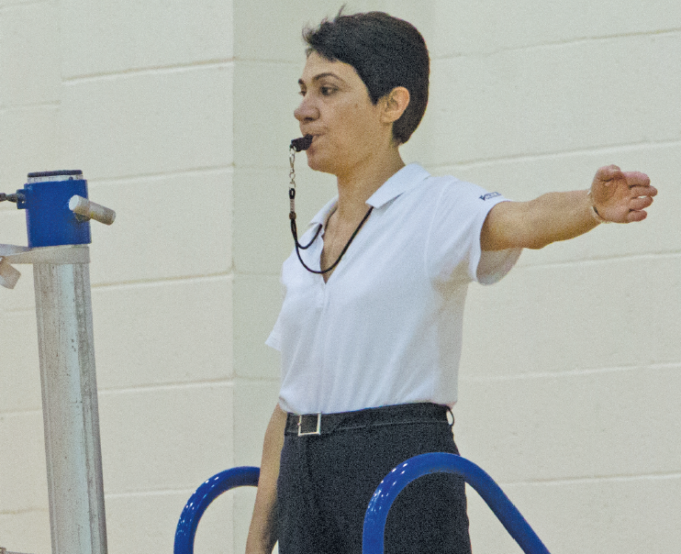“Why didn’t I get any playoff games?” Across the officiating world, that is probably the most frequently asked question by established and even some new officials. Postseason games are a point of pride and perceived as validation for a job well done. So when those assignments don’t come, there can be frustration and confusion.
The query above is usually followed by statements such as, “I don’t understand. (Fill in name of local official) and I started at the same time, took the same officiating classes, advanced at the same time and we both have comparable schedules. Yet (local official) gets playoff games and I don’t. I just don’t get it!”
It’s a fact. Even after working at their preferred sport for years, many high school officials have never been selected to work in the postseason. Others have received one playoff game, but that’s as far as they’ve gotten. It’s no wonder that so many officials are frustrated by their inability to get a playoff game.
Why is there so much emphasis on working the postseason? The way the system is set up, officials (rightly or wrongly) feel playoff games are their reward for officiating well during the regular season. Unless the league, conference or local association has a grading system, officials can (and do) toil for years blissfully unaware of their real competence. In their minds and with their knowledge, they think they’re doing a fine job and that they should be rewarded. They rely on other officials, mostly crewmembers, to grade them, albeit unofficially. They really have no way to measure themselves against their peers.
State associations have mechanisms in place for selecting officials for playoff games, but the vast majority of officials really have little chance of being picked. They feel eventually they will be recognized but the odds are stacked against them.
For example, in a state with 1,205 volleyball officials, 144 are needed to work regional and state contests. That’s less than 12 percent of the available group. For each one selected, roughly eight are not. And in sports with more participants and hence more officials, the odds are much worse.
Why do some officials with the same skills as their peers continue to get multiple playoff games? I’m sure everyone realizes that name recognition is a huge factor in securing games. It certainly helps to be a school administrator, an educator, an association secretary, a league assigner or the member of an accomplished crew working more than one sport.
Many officials do not fit into any of those categories. Those that do have a leg up on the others. But there is hope. There are many other ways to be recognized. Taking a leadership role in your local association brings you out from under the bushel basket, so to speak, and creates name recognition. Going to camps and clinics also increases your visibility. Officials talk. Make sure they know who you are. Introduce yourself to others. Don’t be shy.
Look to the state association if you are blocked at the local level. Many state associations are looking for volunteers for seminars, observing, even assigning. Make yourself available and you might be surprised at the opportunities that may come your way.
Work as many lower level games as possible. Lower level athletic directors and coaches eventually move up and become athletic directors and varsity coaches. If you do a good job for them today, you could get an opportunity to work for them tomorrow, when both of you have moved up in the ranks. Continue to work hard and they’re likely to recommend you for playoff games. Coaches and administrators have long memories. While that can sometimes work against you, it can also be a stepping stone to bigger and better things.
Working multiple sports is another way to raise your profile. At smaller schools, the head football coach is the assistant basketball coach. Even at the bigger schools, coaches talk among themselves. Prove competence in multiple sports and they’ll get the idea on their own that you’re someone worth advancement.
Give the same effort in all games, and not only in the perceived “big” games. How many times have you worked with an official just putting in the time to get a check and get out of there? Sure, we all are more interested in the varsity game with a championship on the line, but those don’t come along every day.
Be the best crewmember you can be, especially when working with a variety of partners. Prominent officials are often asked for recommendations, and their word carries a lot of weight.
Mentoring newer officials can be helpful in multiple ways. Surprisingly (or maybe not so surprisingly), mentors usually discover they learn as much or even more by tutoring new or even experienced officials. Your willingness to encourage less experienced officials will be viewed positively.
Don’t comment on coaches and especially other officials. If you use social media, refrain from officiating related topics. People like gossip but not gossipers.
We can’t guarantee that those methods will get you more playoff games. But if you use the techniques outlined above, along the way you’ll met many people, expand your officiating knowledge and became recognized across your state as a quality official. That designation has never hurt when it comes time for playoff assignments.
What's Your Call? Leave a Comment:
Note: This article is archival in nature. Rules, interpretations, mechanics, philosophies and other information may or may not be correct for the current year.
This article is the copyright of ©Referee Enterprises, Inc., and may not be republished in whole or in part online, in print or in any capacity without expressed written permission from Referee. The article is made available for educational use by individuals.


















